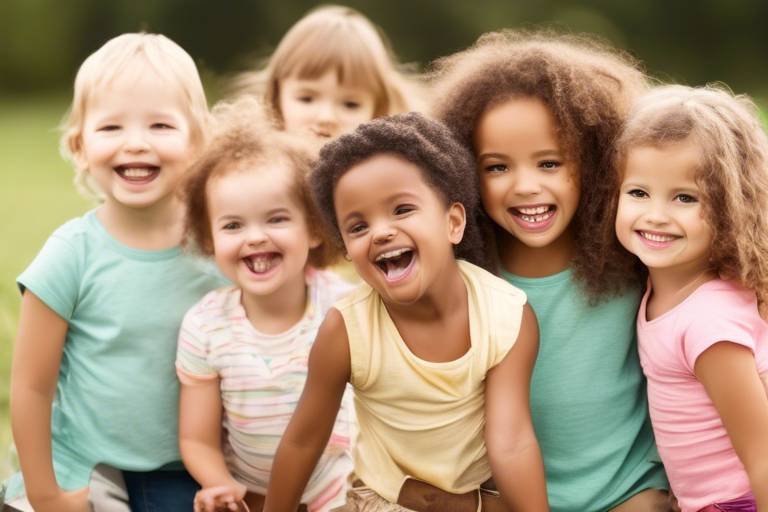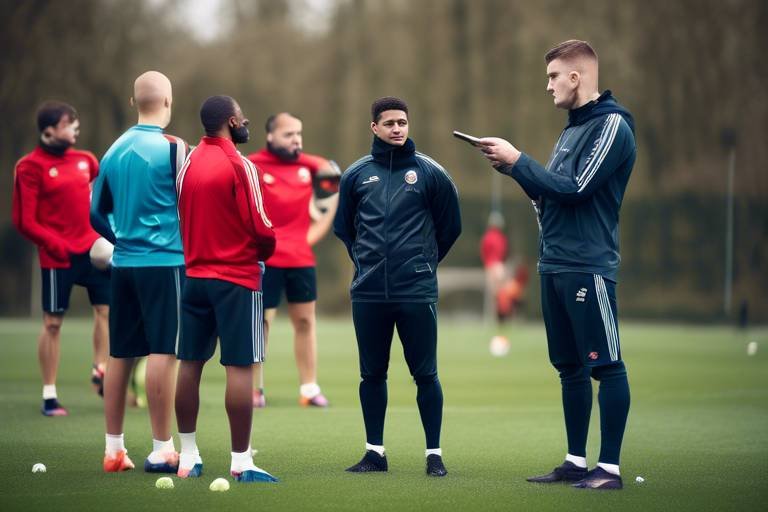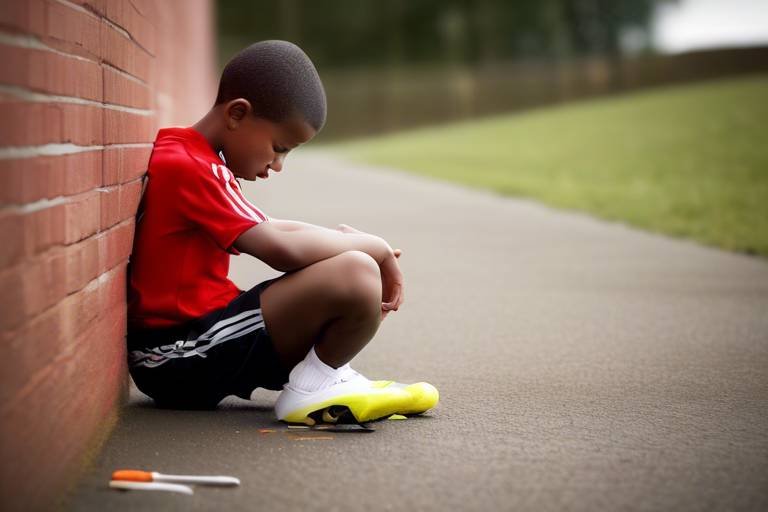Understanding the Benefits of Group Playdates
Group playdates are not just a fun way for kids to spend their time; they are a treasure trove of benefits that contribute significantly to a child's growth and development. Imagine a vibrant playground filled with laughter, where children are not only having a blast but also learning vital life skills. These playdates create a dynamic environment where kids can explore their social skills, emotional intelligence, and physical abilities, all while forming friendships that could last a lifetime. So, what exactly makes group playdates so beneficial? Let’s dive into the various advantages that come with this delightful social experience.
One of the most significant advantages of group playdates is the opportunity they provide for children to enhance their social skills. In a world where communication and relationship-building are crucial, these interactions serve as a training ground for essential skills like sharing, cooperation, and conflict resolution. Think of it as a mini society where kids learn to navigate social environments. For instance, when kids take turns on a swing or share toys, they are practicing the art of sharing and understanding the importance of cooperation. These experiences lay the groundwork for building healthy relationships throughout their lives.
Group playdates also play a vital role in fostering emotional development. By engaging with their peers, children have the chance to express their feelings freely and learn to empathize with others. It's like a mini emotional boot camp, where kids can flex their emotional muscles in a supportive setting. They learn to recognize their emotions, articulate them, and, most importantly, understand that their friends have feelings too. This emotional intelligence is foundational for healthy interpersonal relationships.
Empathy is a crucial component of emotional growth, and group playdates provide the perfect backdrop for cultivating this skill. When children interact with their peers, they begin to understand and share the feelings of others. For example, if a friend is upset because they lost a game, another child might comfort them, demonstrating empathy. These moments not only strengthen emotional connections but also teach kids the importance of being there for one another, creating a supportive network among friends.
Conflict is an inevitable part of life, and group playdates offer a safe space for children to encounter and resolve disputes. Whether it’s deciding who gets to play with a toy first or negotiating the rules of a game, these situations teach kids valuable problem-solving skills. They learn to communicate their feelings, listen to others, and find compromises. This ability to navigate conflicts will serve them well throughout their lives, both personally and professionally.
In a lively group setting, children are often required to practice self-regulation. They learn to control their impulses, wait their turn, and respond appropriately to various social situations. Imagine a child who wants to grab a toy but instead waits patiently for their turn; this is a significant achievement in emotional and behavioral development. It’s like learning to dance to the rhythm of social interactions, where timing and patience are key.
Engaging with peers in a playful environment is a fantastic way for children to build self-confidence. As they navigate social dynamics and contribute to group activities, they begin to see their value in a group setting. Whether it’s leading a game or simply being part of a team, these experiences reinforce their self-esteem. It’s like planting seeds of confidence that will grow as they continue to engage socially.
Don’t overlook the physical benefits of group playdates! They encourage children to be active, which is crucial for their overall health. Through cooperative games, outdoor play, and shared movement activities, kids develop both gross and fine motor skills. Think of it as a fun fitness class where the only requirement is to play! The more they run, jump, and play, the stronger and more coordinated they become.
During group playdates, children engage in various active play scenarios that not only enhance their physical fitness but also improve their coordination. Whether it’s a game of tag or a friendly soccer match, these activities keep kids moving and laughing. It’s like a natural gym session wrapped in the joy of friendship, making exercise feel effortless and enjoyable.
Collaborative play encourages children to explore their creativity through imaginative games, arts, and crafts. In a group setting, they can bounce ideas off one another, leading to innovative play scenarios that they might not have thought of alone. This creative expression is vital for their development, as it nurtures their imagination and self-expression in a supportive environment.
Group playdates aren’t just beneficial for children; they also serve as an excellent opportunity for parents to connect. As kids play, parents can chat, share experiences, and build supportive networks. This community aspect enhances the overall experience, creating a sense of belonging for both kids and parents.
Parents can exchange valuable resources during these gatherings, such as parenting tips, educational materials, and local activity recommendations. This sharing of knowledge strengthens their connections and ultimately benefits their children's development. Imagine a community of parents supporting each other—it's like having a village to raise your child!
By facilitating group playdates, parents help their children form lasting friendships. These connections can lead to a supportive social network that benefits both kids and parents alike. It’s a win-win situation where friendships blossom, and a sense of community thrives.
- What age is best for group playdates? Typically, group playdates can start as early as age 3, but they are beneficial at any age as children develop social skills.
- How many children should be included in a playdate? A small group of 3 to 5 children is ideal, as it allows for more meaningful interactions and less chaos.
- What activities are best for group playdates? Activities like cooperative games, arts and crafts, and outdoor sports are great for encouraging interaction and teamwork.

Social Skill Development
This article explores the various advantages of group playdates for children, highlighting their impact on social skills, emotional development, and overall well-being while providing practical tips for organizing successful playdates.
Group playdates are like a magical playground for children, where they can dive into the world of social skill development. Imagine a vibrant scene filled with laughter, games, and the joyful chaos of kids interacting. In this dynamic environment, children are not just having fun; they are mastering essential skills that will serve them well throughout their lives. Skills such as sharing, cooperation, and conflict resolution are all put to the test during these playdates, making them a crucial aspect of childhood development.
When children engage in group play, they learn to navigate the complexities of social interactions. For instance, sharing toys or taking turns during a game requires them to communicate effectively and understand the needs of others. This not only helps them develop a sense of fairness but also teaches them the value of teamwork. As they practice these skills, they become more adept at forming healthy relationships with their peers, setting the foundation for future social interactions.
Another significant aspect of social skill development during playdates is the opportunity for children to encounter and resolve conflicts. Picture a scenario where two kids want to play with the same toy. Instead of escalating into a fight, they can learn to negotiate and find a compromise. This process is invaluable; it equips them with the problem-solving skills necessary to handle disagreements constructively. By practicing these techniques in a safe and supportive environment, children become more confident in their ability to manage conflicts as they grow older.
Moreover, group playdates are an excellent platform for children to practice self-regulation. In a bustling playdate setting, they are encouraged to control their impulses, wait their turn, and respond appropriately to various social cues. This practice is crucial, as it teaches them patience and the importance of considering others' feelings. Just like a conductor leading an orchestra, children learn to harmonize their actions with those of their peers, creating a beautiful symphony of social interaction.
In summary, group playdates provide a rich environment for children to enhance their social skills in a fun and engaging way. They learn to share, cooperate, resolve conflicts, and regulate their behavior—all while enjoying the company of their friends. These experiences not only prepare them for future social encounters but also lay the groundwork for a lifetime of healthy relationships.
Participating in group playdates helps children develop emotional intelligence by allowing them to express feelings, empathize with peers, and manage their emotions in a supportive setting.
Through interactions with peers, children learn to understand and share the feelings of others, fostering empathy and strengthening their emotional connections with friends.
Group playdates provide a platform for children to encounter and resolve conflicts, teaching them valuable problem-solving skills that they will use throughout their lives.
In a group setting, children practice self-regulation by learning to control impulses, wait their turn, and respond appropriately to various social situations.
Engaging with peers in a playful environment helps children build self-confidence as they navigate social dynamics and contribute to group activities.
Group playdates encourage physical activity, promoting gross and fine motor skills through cooperative games, outdoor play, and shared movement activities that are crucial for healthy growth.
Children engage in various active play scenarios during group playdates, enhancing their physical fitness and coordination while having fun with friends.
Collaborative play allows children to explore their creativity through imaginative games, arts, and crafts, fostering innovation and self-expression in a supportive group setting.
Group playdates also serve as an excellent opportunity for parents to connect, share experiences, and build supportive networks, enhancing the community around their children.
Parents can exchange valuable resources, such as parenting tips, educational materials, and local activity recommendations, strengthening their connections and benefiting their children's development.
By facilitating group playdates, parents help their children form lasting friendships, which can lead to a supportive social network that benefits both kids and parents alike.
- What age is appropriate for group playdates? Generally, children aged 3 and older can benefit from group playdates, as they begin to develop social skills.
- How can I organize a successful playdate? Choose a comfortable environment, plan engaging activities, and encourage open communication among children.
- What if my child is shy during playdates? Encourage participation and offer support, but allow them to engage at their own pace.
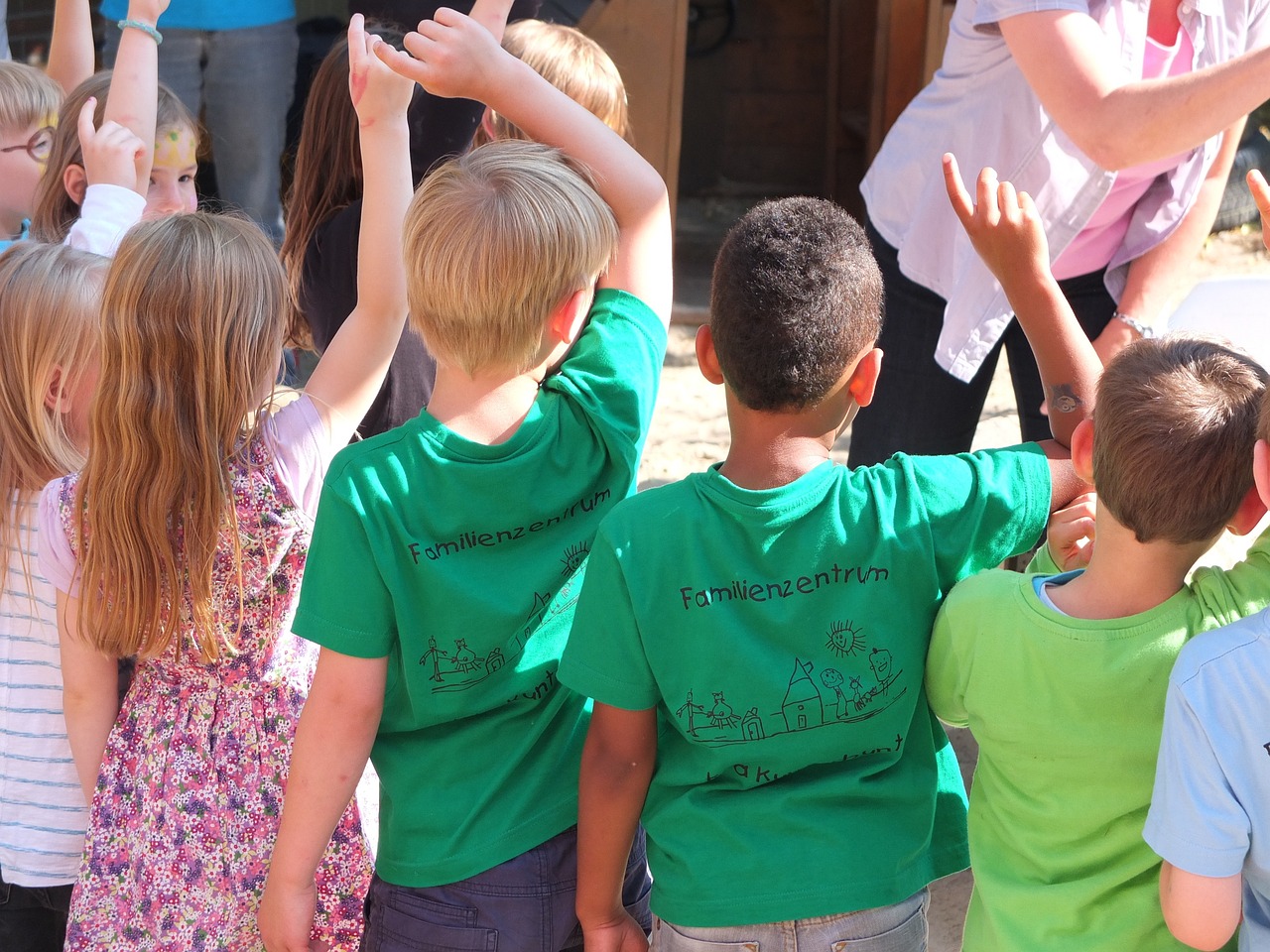
Emotional Growth
Participating in group playdates is more than just fun and games; it's a vital stepping stone in a child's emotional development. When children interact with their peers in a playful environment, they are given the chance to express their feelings openly and learn how to navigate the complex world of emotions. This experience is crucial for developing emotional intelligence, which is the ability to recognize, understand, and manage one’s own emotions while also recognizing and influencing the emotions of others.
One of the most significant benefits of group playdates is that they provide a safe space for children to practice empathy. During play, kids often share their thoughts and feelings, whether they’re excited about a new game or feeling upset when things don’t go as planned. This sharing helps them to not only express their own emotions but also to tune into how their friends are feeling. For instance, if one child is upset after losing a game, others can learn to comfort them, which fosters a sense of community and emotional support.
Through these interactions, children learn to understand and share the feelings of others. They begin to recognize that everyone has their own emotions, which can be similar or different from their own. This understanding is the foundation of empathy, which is essential for forming strong, healthy relationships throughout life. When kids learn to empathize with their peers, they strengthen their emotional connections, making their friendships more meaningful.
Group playdates also serve as an excellent training ground for conflict resolution. Conflicts are inevitable when children play together, whether it's a disagreement over a toy or a difference in game rules. However, these situations provide valuable lessons in problem-solving. Children learn to communicate their feelings, listen to others, and find compromises. For example, if two kids want to play different games, they might negotiate to play one game first and then switch. This process not only resolves the conflict but also teaches them that disagreements can be handled respectfully.
In a group setting, children also practice self-regulation. They learn to control their impulses, wait their turn, and respond appropriately to various social situations. This self-control is crucial not only in play but also in everyday life, as it lays the groundwork for future interactions in school and beyond. For instance, waiting for their turn on the swings helps children understand patience and the importance of sharing space and resources with others.
Engaging with peers in a playful environment also significantly boosts a child's confidence. As they navigate social dynamics and contribute to group activities, they start to feel more secure in their ability to interact with others. This newfound confidence can spill over into other areas of their lives, such as school or extracurricular activities, making them more willing to participate and express themselves. Imagine a child who, after successfully leading a game during a playdate, feels empowered to raise their hand in class or try out for a school play. That’s the kind of growth we’re talking about!
In conclusion, group playdates are a treasure trove of emotional growth opportunities for children. They not only help kids learn to express and manage their emotions effectively but also teach them vital social skills that will benefit them throughout their lives. So, the next time you're organizing a playdate, remember that it's not just about having fun; it's about helping our little ones grow into emotionally intelligent and socially adept individuals.
- What age is best for group playdates? Group playdates can be beneficial for children as young as 2 or 3 years old, as they begin to develop social skills.
- How can I encourage my child to share during playdates? Model sharing behavior yourself and provide positive reinforcement when your child shares with others.
- What activities are best for group playdates? Activities that encourage teamwork and cooperation, such as group games, arts and crafts, or outdoor sports, are ideal.
- How can I address conflicts that arise during playdates? Encourage open communication among the children, guide them in expressing their feelings, and help them find a resolution together.
Building Empathy
Building empathy in children is like planting a seed that grows into a sturdy tree, providing shade and shelter throughout their lives. When children engage in group playdates, they are not just having fun; they are also learning to understand and share the feelings of their peers. This crucial skill helps them forge deeper emotional connections and navigate the complexities of human relationships. Imagine a child watching a friend who has just fallen and scraped their knee. Instead of just giggling or walking away, that child learns to pause, assess the situation, and offer comfort. This moment is a tiny yet significant step toward developing empathy.
During these interactions, children experience a variety of emotions—joy, frustration, excitement, and even disappointment. As they play together, they encounter situations where they must consider the feelings of others. For instance, if one child wants to play a game that another isn't interested in, they learn to negotiate and find a compromise. This process teaches them that it’s essential to listen and be sensitive to others' emotions, which is a vital aspect of empathy.
Moreover, group playdates create a safe space for children to express their feelings openly. When they see their friends reacting to different scenarios—like losing a game or sharing a toy—they begin to recognize and label emotions. This recognition helps them build a vocabulary around feelings, which they can use to articulate their own emotions. It’s not just about saying “I’m sad” or “I’m happy”; it’s about understanding what those feelings mean and how they affect themselves and those around them.
In addition to emotional understanding, children also learn the importance of perspective-taking. They start to grasp that everyone has unique experiences and viewpoints. For example, during a group activity, if one child feels left out, others may begin to notice and ask, “Why do you look sad?” This inquiry promotes a culture of caring and consideration, reinforcing the idea that their actions can impact others.
To further illustrate how group playdates foster empathy, consider the following scenarios:
| Scenario | Empathy Skills Developed |
|---|---|
| Sharing toys during play | Understanding the joy of sharing and the feelings of others |
| Resolving a disagreement over a game | Negotiation skills and recognizing different viewpoints |
| Comforting a friend who is upset | Emotional support and active listening |
Ultimately, group playdates are a powerful tool for nurturing empathy in children. They not only learn to express their feelings but also to respect and understand the emotions of others. This emotional intelligence will serve them well throughout their lives, helping them form healthier relationships and become more compassionate individuals. So, the next time you organize a playdate, remember that you’re not just providing a fun experience; you’re also cultivating a future filled with understanding, kindness, and empathy.
Q1: How can I encourage my child to express their feelings during playdates?
A1: You can encourage your child to express their feelings by modeling emotional language yourself. Use phrases like, “I feel happy when we play together,” or “It’s okay to feel sad if things don’t go as planned.” Create an open environment where discussing emotions is normalized.
Q2: What should I do if my child struggles with sharing during playdates?
A2: If your child struggles with sharing, gently remind them of the importance of taking turns. You can also provide examples of how sharing can lead to more fun for everyone involved. Role-playing scenarios can also be helpful in teaching sharing skills.
Q3: How can I help my child understand other people's perspectives?
A3: Encourage your child to ask questions about their friends' feelings and thoughts. After a playdate, discuss what happened and ask them how they think their friends felt during certain situations. This reflection promotes perspective-taking.
Conflict Resolution Skills
Group playdates are not just about fun and games; they also serve as a vital training ground for children to develop . Imagine a scenario where two kids both want to play with the same toy. Instead of escalating into a shouting match or a tearful standoff, these young friends can learn to navigate their differences in a constructive way. This is where the magic of group playdates comes into play, as they provide a safe environment for children to practice resolving conflicts.
During these playdates, children are often faced with situations that require them to negotiate, compromise, and communicate effectively. For instance, they may need to decide who gets to play the hero in a game of make-believe or how to share limited resources, like a favorite game or outdoor equipment. Through these interactions, kids learn to articulate their feelings and desires, which is crucial for effective communication. They begin to understand that it’s okay to express their needs while also considering the feelings of others.
Moreover, children are naturally inclined to mimic the behavior of adults. When they witness parents or caregivers managing conflicts with grace and understanding, they are likely to adopt similar strategies. This modeling of behavior helps them internalize the importance of empathy and patience, which are essential components of conflict resolution. As they engage in group activities, they learn to identify the emotions of their peers, fostering a sense of community and cooperation.
In addition to verbal communication, group playdates often involve physical interactions, which can sometimes lead to misunderstandings or disagreements. For example, during a game of tag, one child might accidentally bump into another, leading to hurt feelings. Here, children have the opportunity to practice self-regulation—a skill that allows them to manage their reactions and respond appropriately. They learn that instead of retaliating or withdrawing, they can apologize and resolve the situation amicably.
Ultimately, the skills acquired during group playdates extend far beyond the playground. They lay the groundwork for healthy relationships in the future, whether it’s in school, sports teams, or later in life as they navigate the complexities of adult relationships. By learning to resolve conflicts early on, children develop a toolkit of strategies that will serve them well throughout their lives.
- What age is appropriate for group playdates? Generally, children as young as 3 years old can benefit from group playdates, but the dynamics will vary based on age and developmental stage.
- How can I facilitate conflict resolution during playdates? Encourage open communication by guiding children to express their feelings and listen to each other. Role-playing scenarios can also be helpful.
- Are there specific games that promote conflict resolution? Yes! Games that require teamwork, such as building projects or cooperative sports, can enhance collaboration and problem-solving skills.
- What should I do if conflicts escalate? If a conflict becomes too heated, step in calmly to mediate. Help the children articulate their feelings and find a compromise.
Self-Regulation
Self-regulation is a fundamental skill that children develop through group playdates, and it’s more than just a buzzword. Imagine a young child at a playdate, surrounded by their peers, each one bubbling with excitement and energy. In this lively environment, children are not only having fun but are also learning to control their impulses and manage their behaviors. This process is crucial because it lays the groundwork for how they will interact with others throughout their lives. When children learn to wait their turn while playing a game, they're practicing patience—a vital aspect of self-regulation.
During playdates, children are often faced with various social scenarios that require them to think before they act. For instance, if a child wants to grab a toy that another child is playing with, they must decide whether to ask for a turn or to wait patiently. This decision-making process is a key component of self-regulation. It helps them understand the importance of considering others' feelings and perspectives, which is essential for building strong relationships.
Moreover, the supportive atmosphere of group playdates allows children to experiment with self-regulation without the fear of harsh judgment. They can express their emotions—whether it’s excitement, frustration, or joy—while learning to handle those feelings appropriately. For example, if a conflict arises over a toy, children can practice taking deep breaths, discussing their feelings, and finding a solution together. This not only helps them resolve the immediate issue but also equips them with tools to handle similar situations in the future.
As they navigate these interactions, children also learn the importance of setting boundaries. They begin to understand when to assert themselves and when to compromise. Through these experiences, they develop a sense of autonomy, which boosts their confidence and encourages them to engage more fully in social situations. Self-regulation, therefore, is not just about controlling impulses; it’s about fostering a deeper understanding of social dynamics and enhancing emotional intelligence.
In summary, group playdates are a rich environment for children to practice self-regulation. They learn to manage their emotions, understand the concept of waiting, and develop patience—all while having a blast with their friends. This combination of fun and learning is what makes playdates such a valuable experience for young children.
- What is the best age for children to start participating in group playdates?
Group playdates can begin as early as toddlerhood, around 2-3 years old, when children start to engage in parallel play. As they grow older, they can participate in more interactive playdates that foster social skills.
- How can I organize a successful group playdate?
To organize a successful playdate, choose a comfortable environment, plan a mix of structured and unstructured activities, and ensure there are enough adults to supervise. It’s also helpful to communicate with parents about any specific needs or preferences.
- What if my child is shy and hesitant to join group playdates?
It’s normal for some children to be shy. Start with smaller playdates to help them feel comfortable, and gradually increase the number of participants as they gain confidence. Encourage them to engage at their own pace.
Confidence Boosting
Engaging with peers in a playful environment is one of the most effective ways for children to build self-confidence. Think about it: when kids play together, they are not just having fun; they are also navigating the complex web of social interactions. Each time a child takes the initiative to join a game, share a toy, or express an idea, they are taking a small step towards greater self-assurance. It's like climbing a ladder—each rung represents a new experience that helps them reach new heights in their social development.
During group playdates, children often find themselves in situations that require them to express their thoughts and feelings. This is crucial because when they see that their opinions matter and that their contributions are valued by their friends, it reinforces their sense of self-worth. For instance, when a child suggests a game and everyone agrees to play it, that moment becomes a powerful boost to their confidence. They learn that they can lead and influence their peers, which is an invaluable skill that extends far beyond the playground.
Moreover, the collaborative nature of group playdates allows children to experience both success and failure in a safe environment. When they win a game, they feel a surge of pride, and when they lose, they learn resilience. These experiences teach them that it's okay to stumble and that every setback is just a stepping stone toward improvement. For instance, if a child struggles to share a toy but eventually succeeds, they gain a sense of accomplishment that reinforces their ability to handle social challenges. This cycle of trying, failing, and succeeding fosters a strong sense of self-efficacy—the belief that they can achieve their goals.
In addition to direct interactions, group playdates also encourage children to observe their peers. They witness how friends handle various situations, which can inspire them to adopt similar behaviors. For example, if a child sees a peer confidently introducing themselves to someone new, they might be encouraged to do the same in future encounters. This observational learning is a crucial aspect of social development, as it allows children to learn from one another in a dynamic and engaging way.
Ultimately, the confidence gained through group playdates is not just about feeling good in the moment; it has long-lasting effects. Children who regularly engage in these social settings tend to develop stronger interpersonal skills, which can lead to better relationships in school and beyond. They become more adept at navigating social situations, whether it's making new friends, participating in team sports, or collaborating on group projects. This foundational confidence sets the stage for a lifetime of positive social interactions and personal growth.
- How can I organize a successful group playdate? Start by inviting a small group of children, choosing a fun location, and planning engaging activities that encourage interaction.
- What age is best for group playdates? Group playdates can be beneficial for children as young as three, as they start to develop social skills.
- How do I handle conflicts during playdates? It's essential to guide children through conflict resolution by encouraging them to express their feelings and find a compromise.
- Can group playdates help shy children? Absolutely! Group playdates provide a supportive environment that can help shy children come out of their shells and interact more freely.
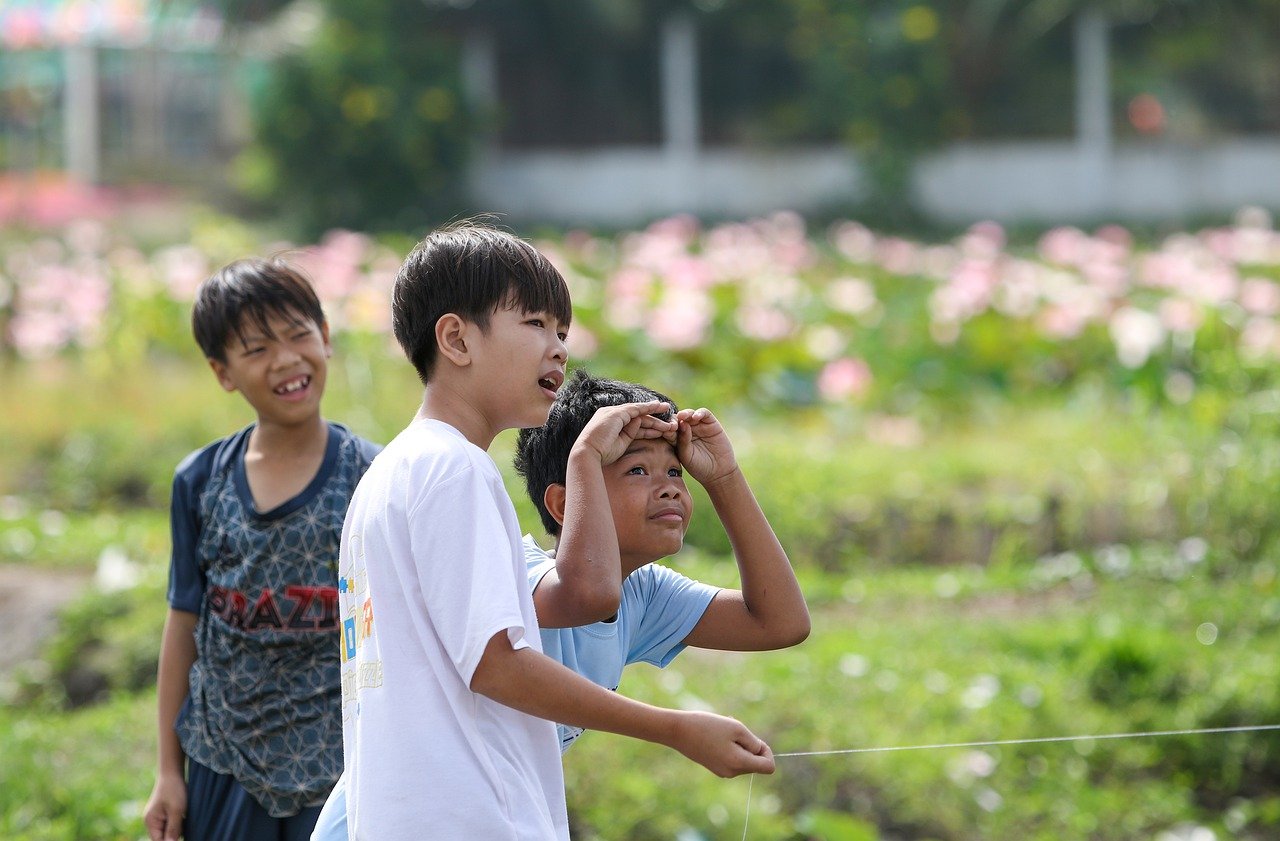
Physical Development
Group playdates are not just about fun; they play a crucial role in promoting among children. When kids come together to play, they engage in various activities that enhance their gross and fine motor skills. From running around in the park to playing cooperative games, these interactions provide a rich environment for children to grow physically. Think about it: when kids are allowed to explore and move freely, they're not just burning off energy; they're also building strength, coordination, and agility.
During group playdates, children often participate in active play opportunities that encourage them to jump, climb, and run. These activities are essential for developing their physical fitness. For instance, when children play tag or engage in relay races, they not only improve their cardiovascular health but also enhance their balance and coordination. This is especially important during early childhood when their bodies are rapidly developing. The more they move, the more they learn about their physical capabilities and limitations.
Moreover, group playdates provide a platform for children to engage in creative expression through physical activities. Imagine a scenario where children collaborate to build a fort using blankets and pillows. This not only involves physical movement but also sparks their imagination. They learn to work together, share ideas, and create something unique, all while enhancing their motor skills. Such activities are not only fun but also critical for their overall development.
To illustrate the impact of physical play on children's development, take a look at the following table:
| Activity | Benefits |
|---|---|
| Tag Games | Improves cardiovascular health, enhances speed and agility. |
| Building Forts | Boosts creativity, enhances fine motor skills through manipulation of materials. |
| Obstacle Courses | Develops balance, coordination, and problem-solving skills. |
| Group Sports | Encourages teamwork, promotes physical fitness, and builds social skills. |
In addition to these physical benefits, group playdates also foster a sense of community and belonging among children. They learn to communicate and collaborate with their peers, which is vital for their social development. When children play together, they naturally form bonds and friendships that can last a lifetime. These relationships are built on shared experiences, laughter, and the joy of movement, making playdates a fundamental aspect of childhood.
- What age is best for group playdates? Group playdates can be beneficial for children as young as 2-3 years old, as they start to develop social skills.
- How can I organize a successful playdate? Choose a safe location, plan a variety of activities, and encourage sharing and cooperation among the children.
- What if my child is shy or hesitant? Start with smaller groups and gradually increase the number of children as they become more comfortable.
- Are there specific activities that promote physical development? Yes! Activities like tag, relay races, and obstacle courses are great for enhancing physical skills.
Active Play Opportunities
When it comes to children's development, active play is a crucial component that shouldn't be overlooked. Group playdates provide a fantastic platform for children to engage in a variety of physical activities that are not only fun but also essential for their growth. Imagine a sunny afternoon where kids are running around, laughing, and playing games like tag or capture the flag. This kind of energetic play not only burns off excess energy but also enhances their physical fitness and coordination. Through these activities, children learn to navigate their surroundings, develop motor skills, and improve their overall health.
During group playdates, children have the opportunity to participate in cooperative games that require teamwork and communication. For instance, games like relay races or group obstacle courses encourage kids to work together towards a common goal. As they strategize and cheer each other on, they are not just having fun; they are also building essential skills like teamwork and leadership. These experiences are invaluable because they teach children how to collaborate, respect others, and understand the importance of working as a team.
Furthermore, the variety of activities available during group playdates can be astonishing. From traditional games like hopscotch and duck-duck-goose to more modern activities like scavenger hunts or sports, the options are endless. This diversity keeps children engaged and excited, allowing them to explore different forms of movement and play. It’s like a mini-adventure every time they meet up! And let’s not forget the benefits of outdoor play; being in nature not only stimulates their senses but also encourages a love for the environment.
To illustrate the benefits of active play opportunities during group playdates, consider the following table:
| Activity | Benefits |
|---|---|
| Tag | Enhances cardiovascular fitness and agility. |
| Relay Races | Promotes teamwork and improves coordination. |
| Obstacle Courses | Develops gross motor skills and problem-solving abilities. |
| Scavenger Hunts | Encourages critical thinking and exploration. |
In conclusion, active play opportunities during group playdates are not just about having fun; they are fundamental to children's physical and social development. By engaging in these activities, children not only improve their health and fitness but also learn valuable life skills that will serve them well in the future. So, next time you're planning a playdate, remember to incorporate plenty of active play to ensure your little ones get the most out of their time together!
- What age is appropriate for group playdates? Group playdates can be beneficial for children as young as 2 years old, but the activities can be tailored to fit various age groups.
- How can I organize a successful group playdate? Choose a suitable location, plan engaging activities, and communicate with parents to ensure everyone is on the same page.
- What if my child is shy or hesitant to join in? Encourage them gently and consider inviting a close friend to help them feel more comfortable in the group setting.
- How often should playdates occur? Regular playdates, such as once a week or bi-weekly, can help children build stronger friendships and social skills.
Creative Expression
When it comes to group playdates, one of the most delightful benefits is the opportunity for . Children are naturally imaginative beings, and when they come together in a playful environment, their creativity can truly flourish. Imagine a group of kids transforming a simple backyard into a magical kingdom or a bustling city! This kind of imaginative play not only entertains them but also nurtures their ability to think outside the box.
During these playdates, children engage in various activities that encourage them to express themselves creatively. From building forts out of cushions to painting masterpieces on canvases, the possibilities are endless. When kids collaborate on projects, they learn to share ideas, negotiate roles, and embrace each other’s creativity. For instance, one child might suggest they create a pirate ship, while another might envision it as a spaceship. This back-and-forth exchange not only enhances their imaginative skills but also teaches them to appreciate diverse perspectives.
Moreover, group playdates often incorporate arts and crafts, which serve as a fantastic medium for children to express their feelings and thoughts. Through painting, drawing, or crafting, kids can communicate emotions that they might not yet have the words for. This form of expression is vital for their emotional development, as it allows them to explore their inner worlds in a safe and supportive environment.
To illustrate the impact of creative play, consider the following table that breaks down some activities that promote creative expression during playdates:
| Activity | Description | Benefits |
|---|---|---|
| Art Projects | Creating paintings, drawings, or crafts together. | Enhances fine motor skills and fosters self-expression. |
| Role-Playing Games | Acting out different characters or scenarios. | Encourages imagination and social interaction. |
| Building Challenges | Constructing structures with blocks or recycled materials. | Promotes teamwork and problem-solving skills. |
In essence, group playdates are a treasure trove of opportunities for children to unleash their creativity. They learn to collaborate, share, and innovate, all while having fun with their friends. This kind of interaction not only enriches their play experience but also contributes significantly to their overall development. So, the next time you're planning a playdate, consider incorporating activities that encourage creative expression. Your little ones will thank you for it!
- What age is best for group playdates? Generally, children aged 3 and up can benefit from group playdates, as they start developing social skills and friendships.
- How can I organize a successful playdate? Choose a safe environment, plan engaging activities, and ensure a balance of free play and structured activities.
- What if my child is shy or introverted? Start with smaller groups and gradually increase the number of children as your child becomes more comfortable.

Parental Networking
Group playdates are not just a playground for kids; they are also a golden opportunity for parents to mingle and create valuable connections. Imagine this: while your little ones are busy building their forts or racing their toy cars, you can engage in meaningful conversations with other parents. This interaction not only strengthens the community but also creates a support system that can be incredibly beneficial for everyone involved.
When parents come together during playdates, they often find common ground. Whether it's sharing parenting tips, discussing the latest educational resources, or even exchanging recommendations for local activities, these moments can lead to lasting friendships. Just like kids learn to share toys, parents learn to share insights that can help them navigate the often challenging world of parenting.
Moreover, these gatherings can foster a sense of belonging. In today’s fast-paced world, it’s easy to feel isolated, but group playdates can help break down those walls. Parents can connect over shared experiences, whether it’s the joys of potty training or the challenges of bedtime routines. This network can be a lifeline, providing emotional support and practical advice.
Consider the benefits of creating a parental network:
- Resource Sharing: Parents can exchange valuable resources, such as parenting tips, educational materials, and local activity recommendations.
- Event Planning: Collaborating on future playdates or family events becomes easier when parents are connected.
- Support System: Having a group of friends who understand the ups and downs of parenting can be incredibly comforting.
Additionally, these networks can evolve into something even more impactful. As friendships grow, parents may find themselves organizing group outings, playdate rotations, or even community service projects. This not only benefits the children but also enriches the parents' lives, creating a vibrant community where everyone feels supported.
In conclusion, parental networking during group playdates is an essential aspect that enhances the overall experience. By fostering connections, sharing resources, and creating a supportive environment, parents can not only help their children thrive socially but also enrich their own lives in the process. So, the next time you plan a playdate, remember: it’s not just about the kids; it’s about building a community that uplifts everyone.
Q1: How can I start organizing group playdates?
A1: Start by reaching out to other parents in your community or your child’s school. You can suggest a casual meetup at a park or your home and see who is interested!
Q2: What activities should we plan for group playdates?
A2: Activities can range from simple games like tag or hide and seek to arts and crafts projects. The key is to keep it engaging and allow for plenty of free play.
Q3: How do I ensure that all children feel included during playdates?
A3: Encourage children to take turns, share toys, and involve everyone in activities. It’s essential to create an environment where every child feels valued and included.
Q4: Can group playdates help my child make friends?
A4: Absolutely! Group playdates provide the perfect setting for children to interact, learn social skills, and build friendships that can last a lifetime.
Sharing Resources
This article explores the various advantages of group playdates for children, highlighting their impact on social skills, emotional development, and overall well-being while providing practical tips for organizing successful playdates.
Group playdates offer children opportunities to enhance their social skills, including sharing, cooperation, and conflict resolution, which are essential for building healthy relationships and navigating social environments.
Participating in group playdates helps children develop emotional intelligence by allowing them to express feelings, empathize with peers, and manage their emotions in a supportive setting.
Through interactions with peers, children learn to understand and share the feelings of others, fostering empathy and strengthening their emotional connections with friends.
Group playdates provide a platform for children to encounter and resolve conflicts, teaching them valuable problem-solving skills that they will use throughout their lives.
In a group setting, children practice self-regulation by learning to control impulses, wait their turn, and respond appropriately to various social situations.
Engaging with peers in a playful environment helps children build self-confidence as they navigate social dynamics and contribute to group activities.
Group playdates encourage physical activity, promoting gross and fine motor skills through cooperative games, outdoor play, and shared movement activities that are crucial for healthy growth.
Children engage in various active play scenarios during group playdates, enhancing their physical fitness and coordination while having fun with friends.
Collaborative play allows children to explore their creativity through imaginative games, arts, and crafts, fostering innovation and self-expression in a supportive group setting.
Group playdates also serve as an excellent opportunity for parents to connect, share experiences, and build supportive networks, enhancing the community around their children.
When parents come together for group playdates, they not only facilitate fun for the kids but also create a unique environment for sharing valuable resources. This exchange can be incredibly beneficial, as parents can discuss a wide range of topics that contribute to their children's growth and well-being. For instance, they might share:
- Parenting Tips: Insights on effective discipline strategies, routines, and communication techniques that have worked for their families.
- Educational Materials: Recommendations for books, online resources, and learning tools that can enrich their children's learning experiences.
- Local Activity Recommendations: Information about nearby parks, play centers, and community events that are suitable for children.
This sharing not only enhances the parenting journey but also fosters a sense of community among parents. By discussing challenges and solutions, they can build lasting friendships that extend beyond their children's playdates. Imagine how powerful it is to have a network of fellow parents who understand your struggles and can offer support, advice, or even a helping hand when needed!
Moreover, these connections often lead to collaborative efforts, such as organizing joint activities, playgroups, or even educational workshops for the kids. By pooling resources, parents can create enriching experiences that might be difficult to achieve individually. In essence, sharing resources transforms group playdates into a hub of learning and support, benefiting both children and parents alike.
- What age is best for group playdates? Group playdates can be beneficial for children as young as two, but the dynamics will vary based on age and developmental stage.
- How can I organize a successful playdate? Start by inviting a small group of children, choose a safe and engaging location, and plan a few activities to keep everyone entertained.
- What if my child is shy? Encourage your child to participate by inviting a familiar friend or engaging in activities that promote interaction.
Creating Lasting Friendships
When it comes to childhood, friendships are like the golden threads that weave the fabric of our social lives. during group playdates is not just a delightful side effect; it's a crucial part of emotional and social development for children. Imagine a world where your child not only plays but also learns the art of building connections that can last a lifetime. Group playdates provide the perfect backdrop for this to unfold.
During these playdates, children are thrown into a vibrant mix of personalities and interests. This environment is rich with opportunities for them to connect with peers, share experiences, and discover common ground. For instance, when kids engage in cooperative games or creative activities, they naturally bond over shared successes and challenges. It’s like planting seeds of friendship that can blossom into beautiful relationships. But how do these playdates facilitate such connections?
One of the key elements is the shared experiences. Whether it's building a fort from cushions, playing tag, or working on an art project together, these activities create memories that children will cherish. They start to see each other not just as playmates but as friends who share a piece of their world. Additionally, these moments of collaboration and teamwork help children understand the importance of communication and compromise, which are vital skills for maintaining friendships.
Moreover, parents play an essential role in fostering these relationships. By organizing group playdates, they not only provide a safe space for children to interact but also model social behavior. Parents can encourage their kids to reach out and include others, teach them how to resolve conflicts amicably, and most importantly, show them how to be a good friend. This guidance lays the groundwork for children to develop strong, supportive friendships that can carry them through life's ups and downs.
In essence, the friendships formed during these playdates can lead to a robust social network that benefits both children and parents. As kids grow, they will likely maintain these connections, leading to a sense of belonging and community. Just like the roots of a tree that intertwine underground, these friendships can provide support and stability as they navigate the challenges of growing up.
To sum it up, group playdates are not merely about fun and games; they are a powerful catalyst for creating lasting friendships. By engaging in shared activities, children learn to connect, communicate, and collaborate, laying the foundation for meaningful relationships that can last a lifetime. So, the next time you’re planning a playdate, remember that you’re not just organizing a get-together; you’re helping to forge friendships that may very well stand the test of time.
- What age is best for group playdates?
Group playdates can benefit children as young as 2-3 years old, as they begin to develop social skills and enjoy interacting with peers.
- How can I ensure a successful playdate?
To ensure success, choose activities that encourage cooperation, set clear expectations, and create a safe environment for children to express themselves.
- What if my child is shy or hesitant to join?
Encourage your child by gradually introducing them to the group and participating in activities together. Positive reinforcement can help boost their confidence.
- How often should playdates occur?
Regular playdates, perhaps once a week or every other week, can help children build and maintain friendships, but it’s important to balance with other activities.
Frequently Asked Questions
- What are the main benefits of group playdates for children?
Group playdates are fantastic for children as they help in developing essential social skills, boosting emotional growth, and enhancing physical development. Kids learn to share, cooperate, and resolve conflicts while also experiencing the joy of playing with others.
- How do group playdates enhance social skills?
During group playdates, children engage in activities that require sharing and cooperation. These interactions provide real-life scenarios where kids can practice communication and conflict resolution, helping them navigate social environments more effectively.
- Can group playdates help with emotional development?
Absolutely! Group playdates create a safe space for children to express their feelings and learn to empathize with their peers. This interaction fosters emotional intelligence, allowing kids to manage their emotions and understand others better.
- What role do parents play in group playdates?
Parents are crucial in organizing group playdates. They can facilitate connections between children and also network with other parents, sharing valuable resources and tips that can enhance both their and their children’s experiences.
- How can I organize a successful group playdate?
To organize a successful group playdate, consider the following tips: choose a safe and engaging location, plan a mix of structured and unstructured activities, ensure there are enough adults to supervise, and encourage participation from all children to foster inclusivity.
- What activities are best for group playdates?
Activities that promote cooperation and creativity work best for group playdates. Think of games like tag, scavenger hunts, or collaborative arts and crafts projects. These activities not only keep kids engaged but also help them build friendships.
- How do group playdates support physical development?
Group playdates encourage children to engage in active play, which is essential for developing gross and fine motor skills. Activities like running, jumping, and playing games enhance their physical fitness while allowing them to have fun with friends.
- Are there any downsides to group playdates?
While group playdates are mostly beneficial, they can sometimes lead to conflicts or feelings of exclusion among children. However, these situations can be valuable learning opportunities for kids to develop their conflict resolution and social skills.

